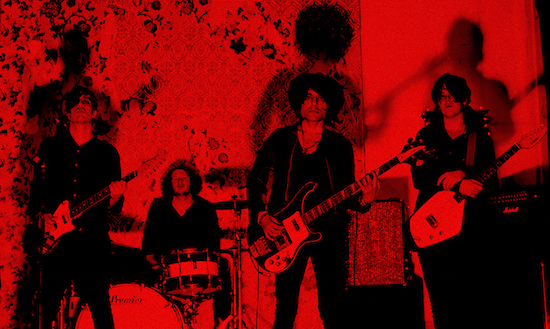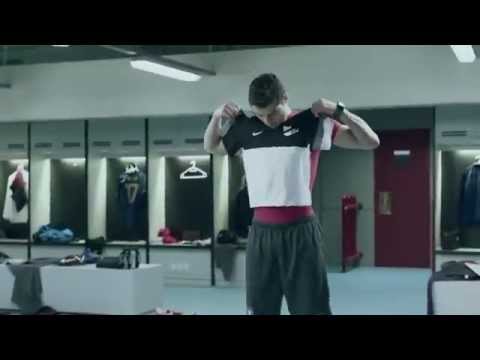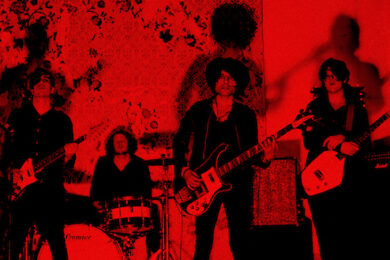Photograph courtesy of Steve Gullick
The story of Piano Wire begins before The Eighties Matchbox B-Line Disaster came into existence. It begins even before Piano Wire’s principal members Andy Huxley and Sym Gharial had met. For those of you unawares, Eighties Matchbox were a glorious and majestic Brighton-based neo-psychobilly five-piece who crashed and burned in spectacular fashion during the decade nobody likes to call the noughties. Eighties Matchbox even had a really cool car, which looked like this.
It is from that wreckage that Piano Wire was pulled (the metaphorical wreckage, not the actual car). "It was kind of strange when I met Andy because the year before that I just lost my closest friend Adam," says Gharial, Piano Wire’s bassist and main lyricist, on the phone from London, where the new band are based. "And Adam and I were supposed to do the whole voyage together really. We discovered everything together: music and clothes and drugs…"
Then Adam unexpectedly died. "A year later I met Andy and it was the weirdest thing. I remember thinking Andy was exactly the same; this good looking, beautiful guy, and they had exactly the same mannerisms and they were both sort of musical geniuses. So it was the weirdest thing in the world."
Huxley was younger than the other members of Eighties Matchbox, joining the band when he was 14. He was chosen by singer Guy ‘I am the son of God’ McKnight, who followed Christ’s ‘fishers of men’ band recruitment policy, fingering the guitarist like a juicy lobster in the tank of a seafood restaurant.
"I don’t have the same self belief that someone like Guy has," says Huxley, also calling from London later that same afternoon. "He just saw me and recruited me. That’s what he did with Matchbox. He just saw everyone, just decided they were going to be in his band based on their image. I was so young then."
People often say that after Britpop, there was no alternative music anymore, but that isn’t true. While Chris Martin was flying around in a Learjet with Gwyneth Paltrow and going to ballgames with Jay Z in the 00s, Eighties Matchbox were kings of the alternative underground, occasionally mustering enough mad energy to storm the charts before disappearing back into a cave, where they’d hang batlike from the ceiling, sleeping the days away and recharging for some more night-time insurgency and hedonism. Theirs was a racket that was imbued with the imperial menace of The Birthday Party, The Cramps and Captain Beefheart all at the same time, though like the best of bands, they put their own individual mark on it all. And they were the best of bands, and surely one of the finest the 21st century has offered up so far. Few groups inspire devotion so fervently, even if on a small scale, and one suspects they’ll get their dues one day. Probably when they’re all dead.
"Yeah, we’ll probably end up on some hats in Topshop or something," says Gharial. "We’re really proud of what it did. It was quite real in the sense that we really were a gang and we really did grow up together, and it really was an all-or-nothing thing. There was always that feeling we were ultimately doomed and that was its destiny I think."
Gharial mentions "it" a lot, and when he does he means Eighties Matchbox. Both he and Huxley talk about it like an entity that made its own decisions irrespective of the band’s collective will, the whole greater than the sum of its parts.
"I’ve no objective understanding of why anything happened, or why anything has happened with that band," says Huxley, sounding befuddled. "I wasn’t in control of it."
"Eighties Matchbox was this volatile, extreme, nasty, abusive, life-enhancing, incredible, tragic monster, this uncontrollable machine," splutters Gharial, "and we sort of felt like the only two survivors of this massive fucking armageddon at the end of it."
At 2002’s Reading Festival, I remember interviewing them in the hospitality area. I was fucked out of my nut and they were talking about their "losing to win" philosophy, which is difficult enough to get your head around at the best of times. They might have been fucked out of their nuts too. Subsequently, I would bump into Gharial time and again, out and about, for years after. He’d invariably be sweating profusely and gurning (I hate to think what I looked like). It was a dangerous game they were playing: Gharial says he nearly died three times towards the end of the band’s first incarnation. He and McKnight got sober in what he refers to as "a lifesaving operation", adding "with Matchbox there was so much energy and life force in that band, and so much destruction as well; you couldn’t really sustain it. We were lucky it lasted ten years and no one died."
"It’s almost like someone did die without anyone actually having done," says Huxley. "The band just had a shelf life and it had an auto-destruct on it, and it was just headed in that direction, and that was it really."
So what about those near-death experiences?
"I got hit by a car and I was overdosing on hard drugs," says Gharial. "I just got to the point where I got sick of being physically ill. I think faced with death, I really, really from somewhere found some inspiration. I realised that I wanted to live and I’m so pleased it didn’t all end in some clichéd tragedy."
By the time TEMBD had finished its first life cycle, Andy Huxley was long gone. He’d not been happy in the band for a while, and it was during the filming of the video for ‘Rise Of The Eagles’ (which The Prodigy have just covered, weirdly enough) that he took leave of the band in a fit of pique.
"The ‘Rise Of The Eagles’ song was kind of the moment," he reflects. "I’d written that, that was going to be the big breakthrough single, I thought I’d done a crossover. Suddenly we were shooting this video and I think the main reason [I left] was because they told me to brush my hair. Have you seen that video? We all had to be security guards to Guy, and I got down there and they made me brush my hair out. It’s one of those ridiculous things. I’ve got a friend whose band split over a cheese sandwich, it was that kind of moment. ‘I can’t be arsed with this anymore. My vision is being impaired.’"
Huxley went off to form Vile Imbeciles, but not before drifting around West Hollywood for a year like a sad younger Lemmy, wondering what to do with himself.
"I don’t really know what happened. I just became disillusioned with everything. I wasn’t really inspired by the whole creative process, being in a band… maybe I still don’t entirely believe in it. It’s a bit like spending your whole life in a toy factory. You get to a point where you go: ‘Actually, this is totally meaningless.’"
I bring up Lemmy. I remember watching that film about him where he’s wandering around and frequenting the bars on the Strip, or sitting in the shit tip of Nazi memorabilia he calls his flat, and it made me wonder if sometimes, when Lemmy’s sat on his own at the bar or putting endless cents into a fruity, does he ever have any moments of self-doubt? Was this what it was all for? As great as he is, it must be limiting being Lemmy.
"That whole myth, the rock & roll myth, I couldn’t buy into it anymore. I left the band and they gave me a publishing deal worth about ten grand, and I had this girlfriend in America so I spent a year over there. And I pretty much was doing that, wandering around on Sunset Boulevard. It’s empty that place. If you ride on the underground you only ever see a few people now and again. It’s deserted. It’s a really, really lonely place."
Huxley went back to England and put Vile Imbeciles together. Incidentally, while some members of his old band were spiraling ever further into their respective addictions at this time, he says in the present that he hasn’t taken any drugs for 14 years. "The rest of the band were all three years older than me, and I could see they were starting to lose it, and I had three years on them, so I just stopped," he explains.
The rest of Eighties Matchbox kept partying where Huxley became more introspective. At one point in our conversation he says, "Sym knows everyone", and I suggest that’s because he used to take more drugs and party all the time. "Yeah, well he’s always talking about how he’s bumping into Mick Jones in the coffee shop around the corner. I’m not really that connected myself."
Eighties Matchbox might have been on the periphery of the mainstream, but then in 2012 something remarkable happened. Ahead of Euro 2012, American plimsoll multinational Nike put out a two-and-a-half minute commercial featuring Cristiano Ronaldo, Neymar, Mario Götze, Wesley Sneijder and a galaxy of other footballing superstars, with ‘Chicken’ as the background music. At the time, it picked up more hits than Adele. Not only did it bring in some lolly, but it got the band talking again. Some shows were hastily arranged, and suddenly TEMBD were selling out venues like the Electric Ballroom in Camden and La Flèche D’Or in Paris in record time. And obviously they must have made some money out of it too. This wasn’t losing to win now was it? This was pure winning. Well, not quite.
"Yeah, we got some money," says Huxley. "I didn’t get that much money for it actually. Basically, I think the day I got the money someone’s roof fell in on my car. Completely obliterated it. So I had to spend the money on a new car. It was literally like I didn’t get the money."
The band’s triumphant return saw them book extra shows at Shepherd’s Bush Empire for the spring, but something alarmed me when I met with McKnight and Gharial at The Ship on Wardour Street, blackcurrant and sodas all round, to discuss the reunion.
"Some pain is worth enduring," said Guy, smiling (or was it a grimace?), when I asked him about the dynamics within the newly reformed band. "I think everyone is as hostile and irritable and as untreatable as they always were."
The reunion was short-lived, the shows at Shepherd’s Bush soon cancelled. It looked like the game was up, but out of Eighties Matchbox’s final act (though you never say never these days, right?) sprang Piano Wire. Huxley and Gharial began writing together again, which proved immediately fruitful. Within three months, they’d written 20 songs together. They now have around 35 songs, with eight being released on the excellent debut EP, The Genius Of The Crowd, this month.
"The songs have just been falling from the sky, it’s this incredible thing," says Gharial. "When this band came about after Matchbox, it wasn’t really a surprise to me. Before I was like: ‘Fucking hell, this friend of mine has come back to life’. It’s quite a brotherly thing because we’ve been writing together for so long now."
Sean Duke and Lenny Verralis make up the rest of the band. Sean looks like a cross between Johnny Marr and David Bowie and somehow makes it to rehearsals even though he lives in Eastbourne. Lenny is Piano Wire’s fourth drummer. The others couldn’t hack the noise levels when they rehearse. Gharial says he was inspired by Arthur Lee’s Love, the Pixies, early Verve and even Elliott Smith, while Huxley describes himself as a "sideman", yielding to Gharial’s vision.
"I was trying to build some kind of anti-empire with Vile Imbeciles," Huxley explains. "Some sort of Beefheart thing where you go off on some odyssey. I got about three albums down and then just got writer’s block. I’d never had writer’s block and then I got about four or five years’ writer’s block. It just happened to be that I’d written about 80 or 90 songs, so we were able to keep doing stuff, but there wasn’t any new material. I’ve still got the writer’s block really. Sym finishes all the tunes off. I’m just doing what I did in Matchbox really where I play to someone’s character."
I tell both Huxley and Gharial that while I love Eighties Matchbox, it’s a relief that Piano Wire are different. They’re pop, but they’re also weird, which is the best kind of pop.
"As much as Andy and I try not to be weird, it’s kind of an innate thing within us really," says Gharial.
"It’s naturally weird," says Huxley. "I think Vile Imbeciles was intentionally weird whereas this is idiosyncratic, which is a slightly different idea. This is how it came out, it’s not a voyage to be weird."
Huxley says the new band is so natural in its delivery that he finds it difficult to listen to what they’ve recorded. He’s not putting on any voices or assuming any characters, which makes it harder to countenance for him personally, even if he feels that it’s a far more emotionally honest venture than Vile Imbeciles ever were. So does it feel like a brand new band, or an extension of the old, old one?
Gharial is quite clear: "To me it feels like a brand new band. Everything feels fresh and exciting. Eighties Matchbox feels like a blurred dream and sometimes you think, ‘Did that actually happen?’ It’s like a different sort of hedonism now. I still believe in that hedonistic stuff, but I don’t think it has to be so negative and associated with drugs and alcohol and the cliches of rock & roll. You can still have an indulgent belief that the beauty of music can change the world and the personalities in it can change everything. You’ve got to have something to give yourself to, otherwise you might as well jump off a cliff or something. And for me we’ve really thrown ourselves into that."
It’s like the next logical progression, according to Huxley. "It’s the only thing you could possibly do as a follow-up. It sort of is exactly right. We couldn’t do another Matchbox record, it would be impossible. It would ruin everything. I mean they shouldn’t really have done the last one [2010’s Blood And Fire], it was a mistake in my opinion. I don’t know what the others are doing, but this is sort of the spiritual heir to it. I don’t think anyone’s done anything valuable since the second Eighties Matchbox record [2004’s The Royal Society] until now really."
Huxley is concerned that what he’s saying might sound overblown. If he’s dismissive about his former band members’ projects then he’s also writing off three of his own albums as Vile Imbeciles. "Guy might come out with something, I don’t know what," he adds finally. "This feels like it’s maybe the New Order to the Joy Division. Apart from the fact that nobody died."
The Genius Of The Crowd is out now on Something In Construction. Get hold of it digitally or on signed vinyl, as part of a 300-copy run. Piano Wire play The Shacklewell Arms in London on June 16 and Brighton’s Green Door Store on June 22




